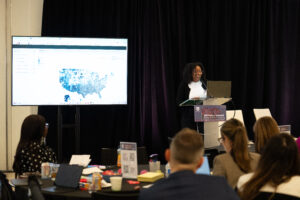How JED Helped Macaulay Honors College Make Mental Health Central to Student Success
When Dara Byrne became dean of CUNY’s Macaulay Honors College in 2022, she encountered a paradox. Some of the city’s most accomplished students were facing ...

By Rebecca Bauer
At a time when artificial intelligence (AI) and shifting policy landscapes are redefining how young people receive care, The Jed Foundation’s 2025 Policy Summit, Meeting the Moment: Sustaining Progress in Youth Mental Health, brought together researchers, policymakers, and youth leaders to chart the path forward. Throughout the day, speakers examined how technology is reshaping both risk and opportunity, how states are embedding behavioral health into their strategic planning, and how evidence and youth voice must drive future systems of support.
Setting the tone for the day, Dr. Zainab Okolo, JED’s Senior Vice President of Policy, Advocacy, and Government Relations, reminded attendees that “progress must be built intentionally, structurally, and with sustainability in mind. We have to move beyond short-term interventions toward long-term systems of change.” From cutting-edge research on AI and adolescent well-being to frameworks for trauma-informed education and community resilience, the summit invited participants to look beyond crisis response toward a shared goal: building data-driven and human-centered systems that protect and promote youth mental health and prevent suicide.
The need to address AI’s impact on teens and young adults with deliberate and urgent action was clear from the first session. U.S. Representative Becca Balint (D-VT) opened the day with candid reflections on her own mental health journey. She then focused on what she’s hearing from educators, parents, and teens about how technology is shaping young people’s lives and on the role Congress can play in reducing tech’s harms. She didn’t mince words: “The algorithms are engineered for compulsive use rather than engagement.… You have companies making a tremendous amount of money off of our attention, and we have a right to say no, because it’s killing us.”
Her message framed the conversations that followed: The mental health challenges facing young people are inseparable from the digital environment they inhabit. Meeting this moment will require accountability and collective resolve.
Speakers stressed that this moment offers a chance to learn from the past. As Danny Weiss, the chief advocacy officer at Common Sense Media put it: “After spending 20 years not regulating social media, we see where we ended up.” Our country failed to protect children from the perils of social media, allowing corporations to unleash these platforms unchecked, he said. Young people are already living with the consequences of technologies that evolved faster than the systems designed to protect them. Now we are seeing the same pattern play out with AI, and we cannot afford to leave the problems unaddressed.
What can we do moving forward? Participants called for action on multiple fronts:
Throughout the day, speakers emphasized the need to strengthen systems and prioritize prevention alongside innovation.
Panelists highlighted how strong leadership and cross-sector collaboration — from Utah’s SAFE crisis response app and behavioral health plan to the Southern Regional Education Board’s counselor training programs — are turning ideas into impact. A youth panel reinforced the value of early awareness and open dialogue, with Dartmouth freshman Trace Ribble speaking about breaking stigma in rural communities and Rohan Satija, one of JED’s 2025 Student Voice of Mental Health Award honorees, describing Let’s Learn, his initiative to bring mental health literacy into classrooms.
Conversations about equity reminded attendees that real progress depends on understanding the conditions that shape mental health outcomes. It also means investing in community spaces such as libraries, parks, and civic institutions that promote well-being beyond clinical care.
These discussions painted a broad picture of the challenges and opportunities ahead, but the conversation repeatedly returned to one powerful theme: the rise of AI. It was the thread that tied together questions of access and prevention, underscoring how technology now shapes every part of young people’s lives. The choices made now will determine whether AI becomes a force that widens gaps or one that strengthens connection, care, and access. The path forward isn’t just about managing technology, it’s about having the courage to ensure that the next generation inherits tools that heal rather than harm.
If you or someone you know needs to talk to someone right now, text, call, or chat 988 for a free confidential conversation with a trained counselor 24/7.
You can also contact the Crisis Text Line by texting HOME to 741-741.
If this is a medical emergency or if there is immediate danger of harm, call 911 and explain that you need support for a mental health crisis.